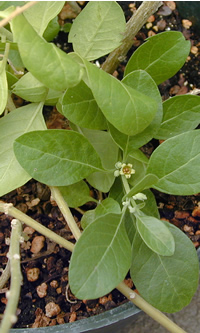Medicinal Uses & Health Benefits of Ashwagandha Root
Ashwagandha is often touted as the Indian version of ginseng because, like ginseng, ashwagandha is revered as a non-specific tonic and adaptogen. Adaptogens are important in cases of ongoing, chronic stress. Ashwagandha root rejuvenates without being over stimulating, so is more useful than ginseng in weakened and debilitated persons. 3
Ashwagandhas acts as a mild sedative, and as indicated by its botanical namesomnifera, it promotes restful, deep sleep.Ayurvedic medicine has used ashwaganda as a general tonic for centuries and this herb may be just the thing for today's stressed and burned out populace. 1
One of the chemically active ingredients found in the leaves of ashwagandha is withanolides. These phytochemicals appear to have a steroid like effect, meaning that they indirectly increase activity of steroidal hormones like testosterone and progesterone. Because of testosterone's effect on sex drive, this could be what is behind ashwagandha's purported aphrodisiac effects. Withanolide D has shown antibiotic and antitumor activities as well.3
Ashwagandha also relaxes blood vessels and stimulates circulation and has an anti-inflammatory and tonic effect in rheumatic and autoimmune conditions such as rheumatoid arthritis and lupus. Animal studies have found that naturally occurring steroids in ashwaganda are more potent than treatment with the synthetic steroid hydrocortisone for controlling inflammation. Ashwagandha is also used in the treatment of low back pain and sciatica. 1
Ayurvedic Medicine Mildly warming. Ayurvedic physicians prescribe the root as an all purpose tonic, a grounding herb that stabilizes mood.
Ashwagandha Side Effects: Not recommended during pregnancy, except under the care of an experienced herbal practitioner.
How to Use: Ashwagandha
Preparation Methods & Dosage :Decoction of the root, 1 teaspoon of root powder to 1 cup water, mixed in an equal part of ghee (clarified butter), or in warm milk and honey.

Withania somnifera plant
Flowers:Yellow flowers, small, berry-like red fruit
Plant type:Shrub, up to 5 ft in height
Medicinal part:Whole herb
Distribution:India, Pakistan, and Sri Lanka.
Regional Traditions :Ayurvedic
How to Grow Ashwagandha
Hardy annual/Tender perennial. Scarifying seed will help in germination. Prefers rich,loose soil, moderate water, full sun. Collect leaves in the spring, fruit in the fall, and root after berries drop.

very helpful post! thanks ..
ReplyDeleteyou are very welcome
DeleteThis post gives complete details about the ashwagandha and it has given description for the ashwagandha and uses of ashwagandha. Ashwagandha for Alzheimer’s
ReplyDeleteThanks
ReplyDeleteAshwagandha (Withania somnifera)
Ashwagandha also known as Indian ginseng is well known as a rejuvenator, fortifier and strengthener.
Ashwagandha Helpful in balancing both Vata (for relaxing) and Kapha (for rejuvenating).
Benefits
Ashwagandha assists in improvement of mental and physical performance.
Ashwagandha helps in improving stress resistance
Ashwagandha Contribute to increase in vitality, vigor and sexual performance
http://www.sandhuproducts.com/Ashwagandha/Ashwagandha-60ct
All Ayurveda medicine products offer best and effective herbal medicine for prevention and treatment of anxiety.Ayurveda have lots of herbal medicines for the treatment of diseases.Ashwagandha root extract
ReplyDeleteFantastic Post! Lot of information is helpful in some or the other way. Keep updating ashwagandha root powder benefits
ReplyDelete